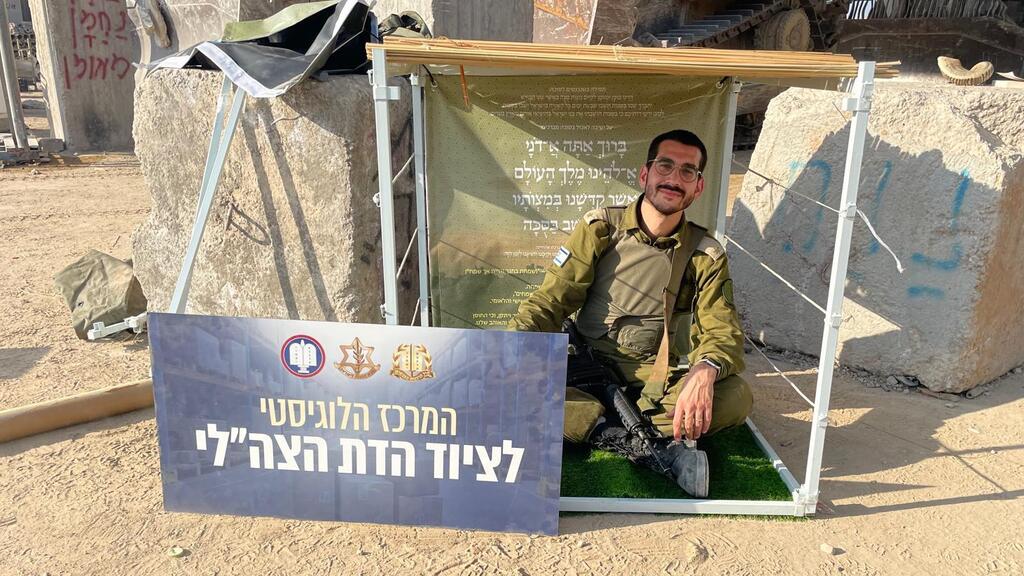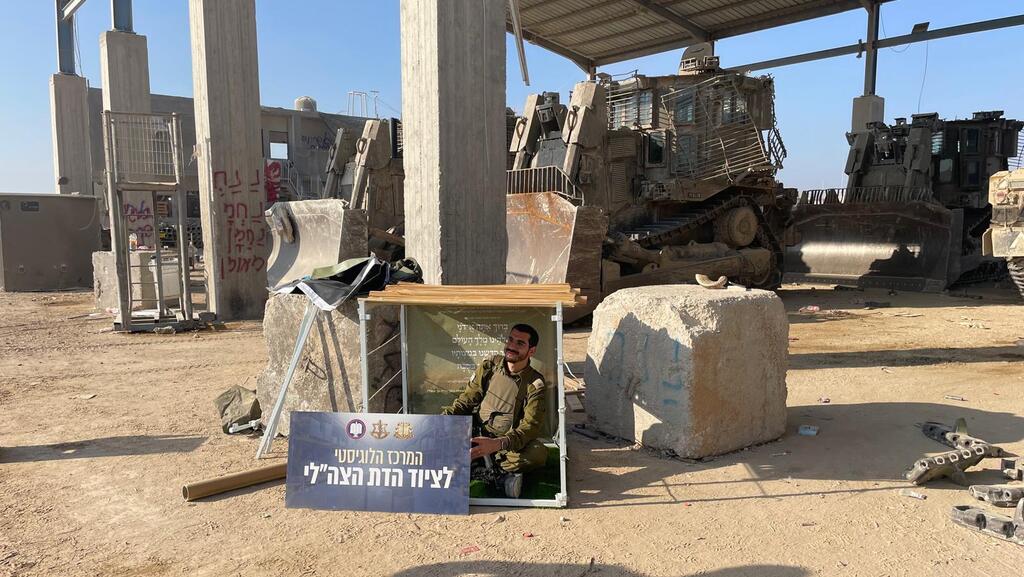Getting your Trinity Audio player ready...
The IDF has introduced the latest innovation for the Sukkot holiday - the tactical sukkah. This compact sukkah unveiled on Tuesday at first may look like it was assembled incorrectly – it stands just about one meter in height, length and width, barely large enough for an adult to sit inside.
But that's precisely the point: These sukkahs are designed according to Jewish Law, while keeping a low profile and reducing the risk that a bullet or an anti-tank missile might hit soldiers sitting inside.
In addition to the traditional s'chach roof covering, the kit includes an easy-to-assemble metal frame and three elastic straps that make the sukkah’s walls kosher according to Jewish law, without the need for fabric walls.
The Logistics Corps of the IDF's Military Rabbinate emphasizes that per the guidelines approved by the chief military rabbi, "building a sukkah in Gaza or other high-risk areas requires the explicit approval of a commander ranked lieutenant colonel or higher, ensuring that the sukkah poses no security or safety risks."
Along with distributing sukkahs and sets of the four species to all IDF units, the Military Rabbinate has also provided holiday kits to soldiers in southern Lebanon, along the border, and in Gaza and its surrounding areas. Northern Israel received 260 tactical sukkahs and 15,000 pocket-sized prayer books for the holiday season.
Interestingly, many sukkahs in northern Israel from last year weren’t dismantled, as Hezbollah began firing rockets into Israel immediately after the October 7 attack. As a result, many were damaged or worn out, prompting the recent distribution of tens of thousands of replacement parts for sukkahs. Additionally, 4,000 sets of the Four Species and 5,500 holiday law booklets were distributed.
For soldiers in Gaza and the surrounding region, 140 tactical sukkahs, 2,500 compact prayer books, more than 2,400 Four Species sets, and 4,200 holiday law booklets were provided.
Wives of reservists wanted to know if their husbands, returning from combat after weeks of reserve duty, were required to sleep in the sukkah
The obvious question is whether soldiers are even obligated to sit in a sukkah. Many have recently asked Rabbi Yosef Zvi Rimon, rabbi of the Gush Etzion Regional Council, for clarification. He responded: "Soldiers in Gaza, Lebanon, or in combat in the West Bank are exempt from the obligation of sitting in a sukkah. These soldiers aren’t just travelers; they’re engaged in a mitzvah and, as the Talmud teaches, 'one who is occupied with a mitzvah is exempt from another mitzvah,' especially in a defensive war. Soldiers staying at the base, who aren’t in combat, should make an effort to sit in a sukkah, except those in high-alert or stressful situations. In all cases, it’s best to consult with the military rabbi."
For soldiers able to sit in a sukkah but who haven’t received the proper equipment, the rabbi reminds them that a sukkah must be at least "10 handbreadths" high, between 80 cm and 96 cm (2.6 feet and 3.1 feet), depending on different rabbinic opinions, and at least "seven by seven handbreadths" wide, 56 cm by 56 cm (1.8 feet), or 70 cm by 70 cm (2.3 feet) for those more stringent.
When necessary, he notes, "it is permissible to make a sukkah using car doors, with both doors open, and place schach above them. However, make sure the gap beneath the doors isn’t more than 24 cm. You can fix this by placing stones or something stable under the doors, or by parking the car so the doors are above a curb. The third wall can be made by adding a partition or parking another car nearby."
One sensitive issue has arisen in inquiries from the wives of reservists. They wanted to know if their husbands, returning from combat after weeks of reserve duty, were required to sleep in the sukkah, or if, according to Jewish law, they were allowed to sleep with their wives instead.
"The Talmud states that one must not sleep outside the sukkah," Rimon replied, but he emphasized: "Rabbi Moses Isserles justified those who are lenient. He said that since one is supposed to sleep with their spouse as they would at home, and since a wife generally cannot sleep in a sukkah, the husband is also exempt. While this reasoning is considered leniency, and many were hesitant to sleep in the sukkah outside Israel, in Israel, we should strive to have a proper, comfortable sukkah and sleep in it whenever possible. However, in cases of great discomfort – such as when being apart causes distress – this can exempt one from the obligation. For reservists returning home after a long period, it is clearly appropriate and permissible to sleep with their wives."
Get the Ynetnews app on your smartphone:




